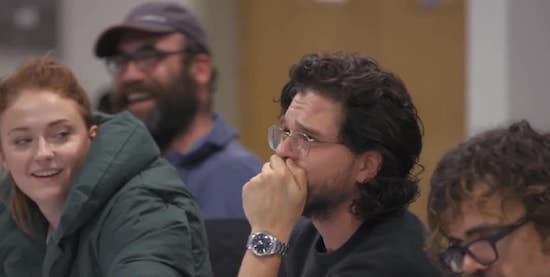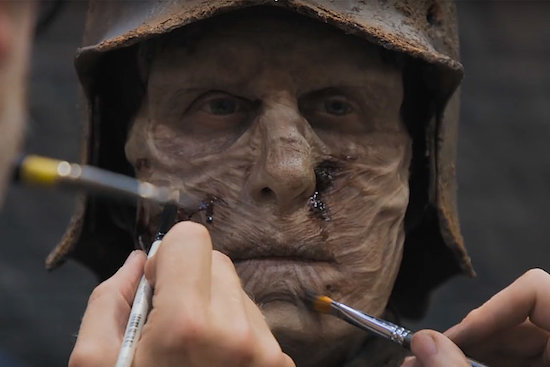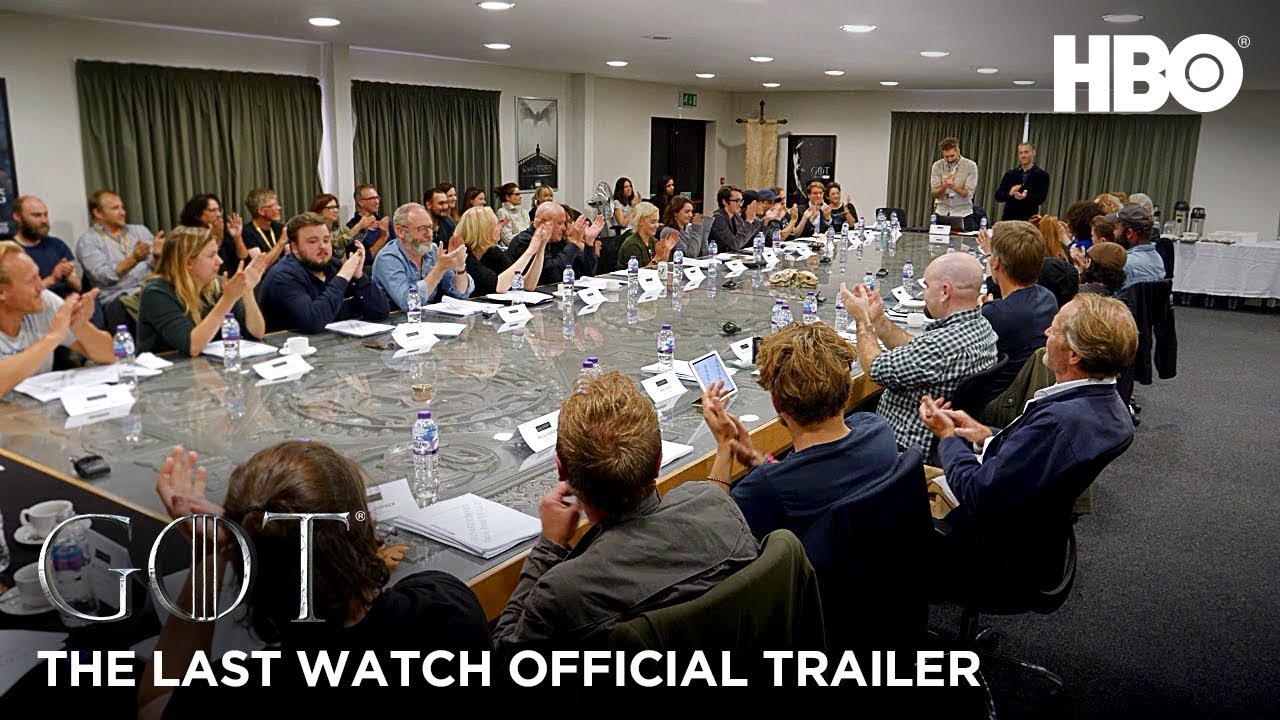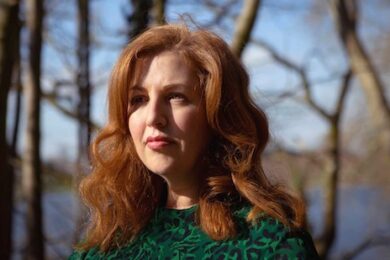There’s a terrific shot in Jeanie Finlay’s The Last Watch, a documentary about the last series of Game of Thrones. We see a camera monitor, showing footage of a slow pan up the walls of Winterfell castle, scene of the epic climatic battle between the forces of the dead and the living. As the camera rises over dark stone, the voiceover recounts not some eve of battle speech, but crew members discussing the lasagne on the menu in the catering tent. It’s a brilliantly light-hearted touch that says a lot about this down-to-earth and refreshingly un-Hollywood, never glitzy documentary. Where most contemporary bonus features around TV series or films are tedious narrations, geeky expositions on technique, or cheesy Q&As with actors caught halfway between being themselves and their characters, The Last Watch continues Finlay’s knack for celebrating idiosyncratic human stories that we’ve previously seen in Orion, The Great Hip Hop Hoax and Panto!, a documentary about a Nottingham production of Puss In Boots. Indeed, you half get the sense that Finlay has made such a success of The Last Watch by treating the world’s biggest-ever TV series just like a giant panto, focussing on intimate narratives rather than the undeniable spectacle.
"The biggest thing with making an observational film is to not get overwhelmed by all the toys and explosions and burning people, and to think, ‘What am I trying to do here?’ – and try and keep focus," Finlay reflects at the end of an exhausting press schedule and two year process which demanded the utmost secrecy. Barely anyone knew Finlay was making a documentary about the HBO series until she announced it on social media just days before broadcast. "I wasn’t a megafan and I dipped in and out," says Finlay of her relationship with Game Of Thrones, "but I took this as an opportunity to absolutely immerse myself. The things I really responded to in the show were big enormous battles like Battle Of The Bastards, which was just amazing, but I loved all the evil characters, like the Lady Of Thorns, played by Diana Rigg – she was a baddass bitch. I really love Cersei, and the Hound, Arya and in this series the Night King."
Over the past decade, Game Of Thrones has become a cultural phenomenon far greater than the sum of its parts, and The Last Watch delves into the complexity of the relationship the series has with fandom. Finlay gives an insight into how online theories as to how GOT might end were deliberately fed and misled by having characters from past series, such as the Wraith or faceless man Jaqen H’ghar appearing at shooting locations. By dropping former characters into locations as red herrings, Game Of Thrones producers used the intensity of fan obsession to their own end. They even shot a fake scene in which John Snow bends the knee to Cersei Lannister. Even Finlay got caught up in the subterfuge. "There was a story built from Reddit threads that episode six wasn’t actually the end and the documentary was fake, but that’s territory I’ve been in before. People thought Orion was a fake, people thought The Great Hip Hop Hoax was a fake and that I was an actress. We live in a time of conspiracy theories and no-one believes anything, so when you’re being your most straightforward, it confuses people."
For all the secrecy, footage of the construction of giant sets, and emotional scenes involving key actors finding out how their character arcs end, it’s not the big names who are the stars of The Last Watch, but the crew and extras who made the series happen. At the start of the filming process, Finlay and her cameraman moved into a small flat in Belfast right next to the studio, in among the stunt crews and production staff. "I kept bumping into the Night King in the Spar," she says. That shop was in part how she found the characters who give The Last Watch it’s emotional weight. "I wouldn’t call it casting, and it’s hard to describe what that chemistry is that makes you go, ‘Ah this is the person’, but I do get this feeling, it’s like when you fall in love and you can’t quite describe why." As the epic series is about various dynasties fighting for the Iron Throne, Finlay created a framework for herself by "asking, very loosely, can we find seven amazing heartfelt, very under-sung, quietly-spoken, modest but fascinating characters in a cast of 2000. How do you tell a big story? You tell it with human stories."

These characters, with their backstories of overcoming sometimes difficult lives to end up as part of the biggest TV series the world has ever seen, are what drive The Last Watch forward so brilliantly. There’s the snow technician, furious that the genuine blizzards delivered by the Beast From The East storm are messing up the carefully arranged fake snowdrifts – real and pretend apparently do not mix. Stuntman Vladimir Furdik, who played the Night King, escaped from a life of crime in post-Communist Czechoslovakia. "I thought it was an amazing story," Finlay says, "he’s arguably the most visible villain in the world, but nobody knows he’s a sweet-natured guy who turned down being a baddy in real life". Then there’s the brilliant Andy McClay, a Stark soldier, who turned up to his initial audition despite his flat burning down the night before, and who concludes the film, running coach tours around GOT locations in Northern Ireland.

McClay, a bearded GOT obsessive in a Motorhead t-shirt, provides many of the funniest moments in The Last Watch. But he’s just one of many, such as the aforementioned lasagne scene, the Unsullied army marching past the tea and toastie van, the fast Derry patter of the Stark soldiers, and Bran and the Night King sat together, the former reading a copy of Private Eye. "We wanted to include things that made us laugh, like series director David Nutter drinking the worst cup of coffee in the world," Finlay says; "there’s a weird incongruity about seeing these extraordinary things but you’re thinking about what’s next on the menu because you need to get through the night shoot." This everyday normality was captured thanks to Finlay and her crew’s quiet presence on set, even in some of the most pivotal scenes in the series. "You don’t just show up and point cameras in people’s faces, you gain trust and are decent and polite, you show up early – we got there when the crew did, we were knackered". That making the final series was a real slog comes across brilliantly in the documentary, with exhausted-looking cast and crew breathing steam in the cold Northern Irish winter air during the weeks of night shoots for The Battle Of Winterfell episode. Finlay captures Maisie Williams between takes in the scene where her character Arya kills the Night King with Valerian steel dagger in one hand, hot water bottle in the other – she looks wiped out. "I had huge empathy for them," Finlay says.

This empathy is none clearly shown than in the focus on make-up expert Sarah Gower, who with her partner Barrie was responsible for creating the mouldering look of the undead wights and umpteen gashes, stab wounds and other gruesome injuries. "Their studio was like being back at art school, though I have a hair phobia and there were wigs everywhere, it was a nightmare," Finlay says. She picked up on how hard it was for Gower to spend so much time working intensely away from her daughter. "I really felt for her being away from her child. My daughter is now 15 and I got my first film commission when I was six months pregnant, so my life as a filmmaker has always been as a parent. There’s a real fall off of women directors, a lot of women don’t get to make their first film and to make more than two is astonishing. It can be hard. I don’t want to make it so gendered, but one of the biggest challenges facing parents is affordable childcare. The hours that you work on set are not compatible with a family". Finlay’s own daughter was doing her GCSE’s at the time, and her husband stayed at home to support her. Exams finished, she travelled to Belfast to play a wildling in the final scene of the series.
From Kit Harrington’s tears at the end of his final scene as John Snow to Emilia Clarke putting on Daenerys Targaryen’s wig for the last time, The Last Watch is a deep exploration of the impact that such a long-running programme has one the lives of everyone involved. You really feel for Stark soldier McClay, hanging up his costume, and leaving the Belfast studio back for the real world. Happily, he was able to pick up his sword for one last time, acting as a guard for Finlay at the premiere of her documentary in Belfast. " I was terrified – the fans of Game of Thrones have been so passionate and vocal I was bracing myself for people to hate The Last Watch and to tell me how much they hated it, I was mentally steeling myself for rejection, as well as feeling proud of the film I’d made and hoping people had understood what I wanted to do." Thankfully, McClay didn’t need to draw the blood of any doubters. Now that Finlay’s own watch has ended she’ll be preparing for the release of her next film Seahorse, a documentary about Freddy, a trans man who gave birth. Reflecting back over the last two years, she’s full of praise for the unusual autonomy she was given by HBO and Game Of Thrones head honchos D.B. Weiss, David Benioff and Bernie Caulfield. "They let me make my film, which was very brave of them to do," she says; "it was so much work that it would have a hollow experience to get to the end of it and just make something that’s just a job for hire. If I’m going to make a film I’m all in."




